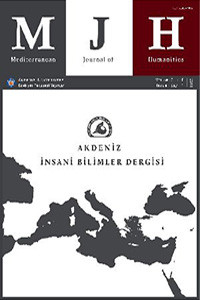Öz
In one’s life there has always been a moment or an event that is so shocking and horrific that it is best to try to push it further and further back into your mind. When traumatized, it is very normal to close the memory and for self-defence to suppress the terrible emotional experience. Sometimes this neglecting and abandoning might be the best way to forget, and so do the characters Sethe and Paul D in Toni Morrison’s Beloved. Trying to ignore their past and to avoid any related confrontations, they try to forget their terrible memories in Beloved. But, I think this forgetting is very temporary and it lasts only until the smallest event prompts the memory and then the formidable past is experienced once again as painful as it once was. Toni Morrison carries Sethe on a kind of journey from being a woman who identifies herself with motherhood, to a woman who begins to identify herself as being a human being. Morrison brings this picture to life by letting Sethe face her past and bring to mind the events that she worked extremely hard to suppress and to forget. It seems impossible for her to remain in denial of the past. In this paper, I argue that the function of memory concerning the past experiences of the main characters in Beloved (especially Sethe and Paul D) depends upon their spatial and temporal relationships. To support my argument, Paul Ricoeur’s theoretical assumptions concerning human memory, together with Daniel L. Schacter’s The Seven Sins of Memory, provide the theoretical background for this analysis.
Anahtar Kelimeler
Kaynakça
- Bassett P. C. (1856). “A Visit to the Slave Mother Who Killed Her Child”. National Anti-Slavery Standard (1856) 1. New York.
- Barbara C. (1993). Toni Morrison: Our Saving Grace. Source: http://garnet.berkeley.edu: 3333/.mags/.38/.black/.bmorris.html. Accessed on 14 June 2016.
- Değirmenci A. (2008). Collective Memory and Social Memory in Contemporary Fiction by Ethnic Women Writers: Louise Erdrich’s ‘Tracks’, Toni Morrison’s ‘Beloved’, and Sandra Cisnero’s ‘Caramelo’. Ankara 2008.
- Denard C. C. (1997). “Beyond the Bitterness of History: Teaching Beloved”. Eds. N. N. McKay & K. Earle, Approaches to Teaching the Novels of Toni Morrison (1997) 48-55. New York.
- Fowler D. & Ann J. A. (1997). “Reading For the ‘Other Side’: Beloved and Requiem for a Nun”. Eds. C. A. Kolmerten, J. B. Wittenberg & S. M. Ross, Unflinching Gaze: Morrison and Faulkner Re- Envisioned (1997) 139-151.
- Jennings L. V. D. (2008). Toni Morrison and the Idea of Africa. New York 2008.
- Kawabata Y. (1999). The First Snow on Fuji. Trans. M. Emmerich. Washington 1999.
- Kotecki G. (2013). “The Ghost Daughter Returns Home: Memory of Slavery in Toni Morrison’s Beloved”. Sociology Study 12/3 (2013) 933-940.
- Lavenne F. -X., Renard V. & Tollet F. (n.d.). “Fiction Between Inner Life and Collective Memory. A Methodological Reflection”. The New Arcadia Review. Published online http://www.bc.edu/ publications/newarcadia/archives/3/fiction/
- Morrison T. (2005). Beloved. London 2005.
- Ricoeur P. (2006). Memory, History, Forgetting. Chicago and London 2006
Ayrıntılar
| Birincil Dil | Türkçe |
|---|---|
| Konular | İngiliz ve İrlanda Dili, Edebiyatı ve Kültürü |
| Bölüm | Araştırma Makaleleri |
| Yazarlar | |
| Yayımlanma Tarihi | 30 Aralık 2016 |
| Yayımlandığı Sayı | Yıl 2016 Cilt: 6 Sayı: 2 |
| Adres: Akdeniz İnsani Bilimler Dergisi Akdeniz Üniversitesi, Edebiyat Fakültesi 07058 Kampüs, Antalya / TÜRKİYE | E-Posta: mjh@akdeniz.edu.tr |


